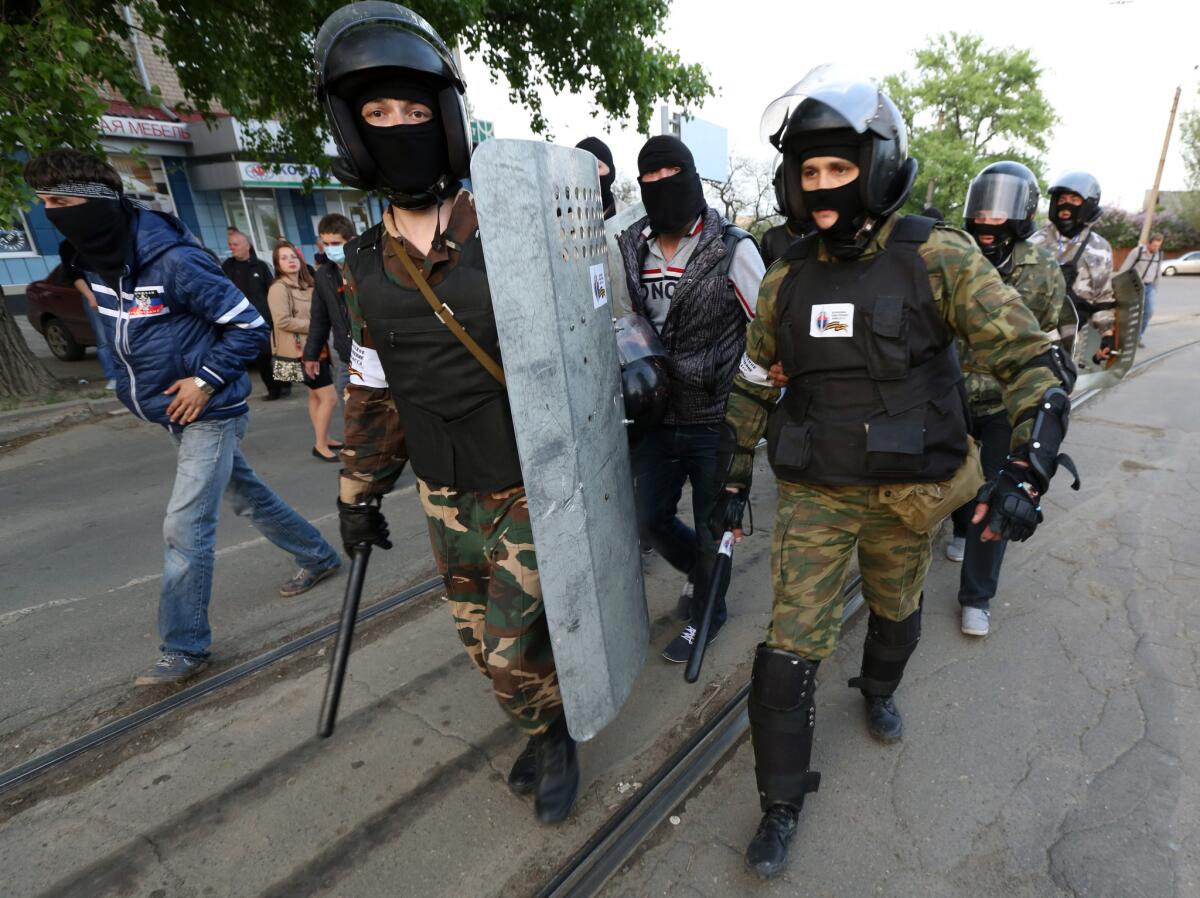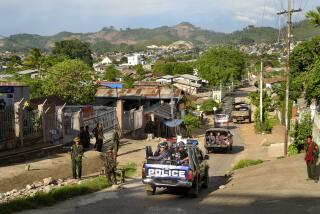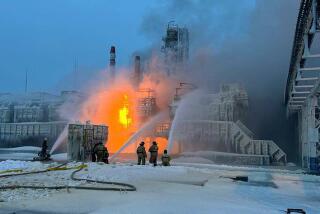In Ukraine, separatists seize one of last government sites in Donetsk

- Share via
Reporting from Donetsk, Ukraine — A crowd of more than 2,000 pro-Russia separatists on Sunday night seized one of the last key official sites in the eastern Ukraine city of Donetsk still in the hands of the country’s interim government.
The demonstrators, some armed with sticks and shields and at least one carrying a hunting rifle, marched about two miles across Donetsk and broke down the doors to the military prosecutor’s office, raising the banner of their movement from the roof.
The building was unguarded, with a couple of police officers standing at a distance looking bored.
The military prosecutor’s office joined the Donetsk regional administration building, Ukraine’s Security Service station and other official sites now in the hands of a pro-Russia rebellion that has engulfed at least two regions in eastern Ukraine.
When the separatists’ flag was raised over the prosecutor’s office, the crowd chanted “Donbass, Donbass, Donbass,” an abbreviation for the Donetsk Goal Basin.
“Where shall we go now?” shouted a masked man in the crowd brandishing a baseball bat and a riot police shield. “What else can we capture today? There is a Leninsky [district] executive council near by. Let’s go get it.”
As the crowd started to move, two helmeted figures intervened, one saying: “Stop! We need to obey a coordinator! Where is he?”
The coordinator, a man in his early 30s, reappeared and said his brief absence was necessitated so he could warn protesters inside the prosecutor’s office not to break anything and just guard the newly acquired premise.
“Let’s walk by the Leninsky council but don’t get inside, as we have done enough for the day,” the coordinator, who gave his name as Miroslav Rudenko, told the crowd.
The separatists have been seizing government facilities in the east since pro-Russian President Viktor Yanukovich was driven from power more than two months ago by protests centered in Kiev. They are widely viewed by Ukraine’s interim government and many in the West as being supported or even directed by Moscow in an effort to imposed Russian control over eastern Ukraine and disrupt a presidential election on May 25 that would give the central government greater legitimacy.
“We capture at least one office building a day, thus depriving Kiev junta of its power base in the city and in the region,” Rudenko, who represented himself as one of the leaders of the self-proclaimed Donetsk Republic, told The Times. “The military prosecutor’s office was one of the repressive tools taking orders from the criminal Kiev regime.”
The protesters are hoping to hold a referendum May 11 that would create an independent republic together with other regions of Ukraine’s east.
“We don’t need to necessarily join Russia in the end but we may join [Russia’s sponsored] customs union and other alliances with Russia,” Rudenko said. “We don’t intend to participate in the presidential election to be held by illegitimate Kiev junta.”
Ukrainian officials say the ongoing rebellion in the Donetsk region has succeeded so far in part because many regional police officers have cooperated with the separatists.
“We need to fire the entire regional police force as Russia-inspired mutiny collaborators,” a high-ranking regional Security Service officer who requested anonymity told The Times. “We urgently need to build a new police force of local patriots, but we are critically losing time.”
The Donetsk Security Service station fell into the hands of separatists on Saturday.
Ukraine acting President Olexandr Turchynov conceded last week that the government had lost control over the Donetsk region and the neighboring Luhansk region, where pro-Russia protesters in a similar fashion occupied most of the government offices and the Security Service station.
In Odessa, where a violent clash triggered a fire that left 43 people dead on Friday, a district police station was surrounded Sunday by several hundred separatists demanding the release of protesters detained during the earlier fighting. In the end, police released 67 people.
“It is necessary to unite Ukraine only through dialogue, unity and consideration for every person’s opinion,” acting Premier Arseny Yatsenyuk said at a meeting with social and cultural activists in Odessa on Sunday. “The process of national dialogue has begun but has been silenced by shots from AK-100 [Kalashnikov] automatic rifles produced in Russia.”
Yatsenyuk once again accused Russia of sponsoring and inciting separatism and terrorism in eastern Ukraine.
Special correspondent Victoria Butenko in Odessa contributed to this report.
More to Read
Sign up for Essential California
The most important California stories and recommendations in your inbox every morning.
You may occasionally receive promotional content from the Los Angeles Times.










